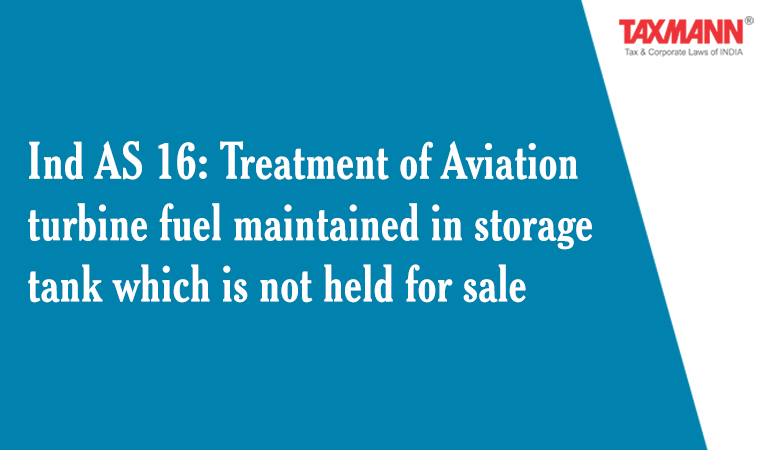Ind AS 16: Treatment of Aviation turbine fuel maintained in storage tank which is not held for sale
- News|Blog|Account & Audit|
- 2 Min Read
- By Taxmann
- |
- Last Updated on 19 November, 2021

As per Ind AS 16 Property, Plant and Equipment, an asset shall be classified as property, plant and equipment, if it is held for use and not for sale in its ordinary course of business. Moreover, when any asset qualifies for recognition as property, plant and equipment, it is initially measured on the cost basis and after recognition of the same, company may follow the cost model or revaluation model as per the policy followed for the entire class of property, plant and equipment. Further, with regard to depreciation, it is the systematic allocation of the depreciable amount of an asset over the useful life of the asset. The useful life of the significant part shall be needed to depreciate separately and disclosure for the same is made in the case where the cost of part of the asset is significant to its total cost and/or its useful life is different from the useful life of the remaining asset.
In one of such example, A Ltd. is a joint venture Company formed by XYZ Ltd. and Oil PSU to create a modern and efficient aviation fuel facility. For the effective operation of storage tanks, the company is required to maintain a minimum level of aviation turbine fuel (ATF) in the storage tanks to operate plant and machinery for its intended use. This ATF is not held for sale and its quantity will never undergo any changes and shall remain intact till the life of the facility. The company accounted for this ATF held in storage tanks under the head ‘Property, Plant & Equipment’ at actual cost. Whether accounting for dead stock of ATF should be done under the head ‘Property, Plant and Equipment’ or it should be classified as inventory? If yes, whether depreciation is to be claimed on ATF and if yes, whether prospectively or retrospectively and methodology of depreciation?
Click Here To Read The Full Story
Disclaimer: The content/information published on the website is only for general information of the user and shall not be construed as legal advice. While the Taxmann has exercised reasonable efforts to ensure the veracity of information/content published, Taxmann shall be under no liability in any manner whatsoever for incorrect information, if any.

Taxmann Publications has a dedicated in-house Research & Editorial Team. This team consists of a team of Chartered Accountants, Company Secretaries, and Lawyers. This team works under the guidance and supervision of editor-in-chief Mr Rakesh Bhargava.
The Research and Editorial Team is responsible for developing reliable and accurate content for the readers. The team follows the six-sigma approach to achieve the benchmark of zero error in its publications and research platforms. The team ensures that the following publication guidelines are thoroughly followed while developing the content:
- The statutory material is obtained only from the authorized and reliable sources
- All the latest developments in the judicial and legislative fields are covered
- Prepare the analytical write-ups on current, controversial, and important issues to help the readers to understand the concept and its implications
- Every content published by Taxmann is complete, accurate and lucid
- All evidence-based statements are supported with proper reference to Section, Circular No., Notification No. or citations
- The golden rules of grammar, style and consistency are thoroughly followed
- Font and size that’s easy to read and remain consistent across all imprint and digital publications are applied



 CA | CS | CMA
CA | CS | CMA
